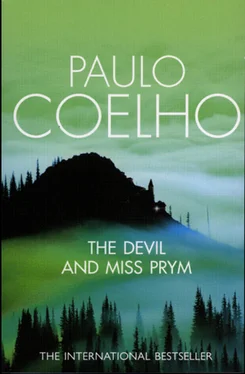The Devil and Miss Prym
Paulo
Coelho
Translated by Amanda Hopkinson
and Nick Caistor

Hail Mary, conceived without sin, pray for us who
turn to Thee for help. Amen.
And a certain ruler asked him, saying, ‘Good Master, what
shall I do to inherit eternal life?’ And Jesus said unto him,
‘Why callest thou me good? None is good, save one, that is God.’
Luke 18 :18-19
Cover Page
Title Page The Devil and Miss Prym Paulo Coelho Translated by Amanda Hopkinson and Nick Caistor
Dedication Hail Mary, conceived without sin, pray for us who turn to Thee for help. Amen.
Epigraph And a certain ruler asked him, saying, ‘Good Master, what shall I do to inherit eternal life?’ And Jesus said unto him, ‘Why callest thou me good? None is good, save one, that is God.’ Luke 18 :18-19
Author’s note
For almost fifteen years
The hotel was, at
The inhabitants of Viscos
Chantal found it virtually
Exhausted, functioning almost like
That night, when she
By the time the
The fork banged repeatedly
The man opened the
‘It’s a good sign,’
Although Viscos had 281
Chantal hesitated no longer
Given the large number
‘Let each of us
‘Let’s drop all this
Chantal arrived at the
The priest dined frugally
The two women reached
‘In church, on hallowed
Chantal breakfasted on the
Berta was watching the
The stranger went into
The Celtic monolith was
Only three people and
Chantal looked for the
THE ALCHEMIST
BY THE RIVER PIEDRA I SAT DOWN AND WEPT
THE FIFTH MOUNTAIN
THE PILGRIMAGE
THE VALKYRIES
VERONIKA DECIDES TO DIE
CONFESSIONS OF A PILGRIM
MANUAL OF THE WARRIOR OF LIGHT
ELEVEN MINUTES
ALSO BY PAULO COELHO
Copyright
About the Publisher
The first story about division comes from ancient Persia: the god of time, having created the universe, sees harmony all around him, but feels that there is still something very important missing – a companion with whom to share all this beauty.
For a thousand years, he prays for a son. The story does not say to whom he prays, given that he is omnipotent, the sole, supreme lord; nevertheless, he prays and, finally, he becomes pregnant.
When he realises he has achieved his heart’s desire, the god of time is filled with remorse, suddenly conscious of how fragile the balance of things is. But it is too late and the child is already on its way. All he achieves by his lamentations is to cause the son he is carrying in his belly to divide into two.
The legend recounts that just as Good (Ormuzd) is born out of the god of time’s prayers, so Evil (Ahriman) is born out of his remorse – twin brothers.
The concerned father arranges everything so that Ormuzd will emerge first from his belly, to take charge of his brother and to prevent Ahriman from throwing the universe into confusion. However, Evil – being very intelligent and resourceful – manages to push Ormuzd aside at the moment of their birth, and thus is the first to see the light of the stars.
Distraught, the god of time resolves to forge alliances on Ormuzd’s behalf: he brings into being the human race so that they can fight alongside Ormuzd and stop Ahriman taking control of everything.
In the Persian legend, the human race is born to be the ally of Good, and, according to tradition, Good will triumph in the end. However, many centuries later, another story about division emerges, this time presenting the opposite view: man as the instrument of Evil.
I imagine that most people will know which story I mean. A man and a woman are in the Garden of Eden, enjoying every imaginable delight. But one thing is forbidden: the couple can never know the meaning of Good and Evil. The Lord God says (Genesis 2: 17): ‘ But of the tree of the knowledge of Good and Evil, thou shalt not eat of it …’.
And one fine day the serpent appears, swearing that this knowledge is more important than paradise itself and that they should possess that knowledge. The woman refuses, saying that God has threatened her with death, but the serpent assures her that nothing of the kind will happen but quite the contrary, for on the day when they learn what Good and Evil are, they will become God’s equals.
Convinced, Eve eats of the forbidden fruit and gives some of it to Adam. From this moment on, the original balance of paradise is destroyed, and the pair are driven out of paradise and cursed. Yet there remain some enigmatic words spoken by God and which confirm what the serpent said: ‘Behold, the man is become as one of us, to know Good and Evil …’. Here, too (as with the god of time who prays for something even though he himself is the lord of the universe), the Bible fails to explain to whom the one God is speaking, and – assuming he is unique – why he should use the expression ‘ one of us’.
Whatever the answer, it is clear that from its very inception the human race has been condemned to exist within the eternal division, always moving between those two opposing poles. So here we are, afflicted by the same doubts as our ancestors. The aim of this book is to tackle this theme, occasionally interpolating into the plot other legends on the subject drawn from the four corners of the earth.
The Devil and Miss Prym concludes the trilogy And on the Seventh Day. The first two books were: By the River Piedra I Sat Down and Wept (1994) and Veronika Decides to Die (1998). Each of the three books is concerned with a week in the life of ordinary people, all of who find themselves suddenly confronted by love, death and power. I have always believed that in the lives of individuals, just as in society at large, the profoundest changes take place within a very reduced time frame. When we least expect it, life sets us a challenge to test our courage and willingness to change; at such a moment, there is no point in pretending that nothing has happened or in saying that we are not yet ready.
The challenge will not wait. Life does not look back. A week is more than enough time for us to decide whether or not to accept our destiny.
Buenos Aires, August 2000
For almost fifteen years, old Berta had spent every day silting outside her front door. The people of Viscos knew that this was normal behaviour amongst old people: they sit dreaming of the past and of their youth; they look out at a world in which they no longer play a part and try to find something to talk to the neighbours about.
Berta, however, had a reason for being there. And that morning her waiting came to an end when she saw the stranger climbing the steep hill up to the village, heading for its one hotel. He did not look as she had so often imagined he would: his clothes were shabby, he wore his hair unfashionably long, he was unshaven.
And he was accompanied by the Devil.
‘My husband’s right,’ she said to herself. ‘If I hadn’t been here, no one would have noticed.’
She was hopeless at telling people’s ages and put the man’s somewhere between forty and fifty. ‘A youngster,’ she thought, using a scale of values that only old people understand. She wondered how long he would be staying, but reached no conclusion; it might be only a short time, since all he had with him was a small rucksack. He would probably just stay one night before moving on to a fate about which she knew nothing and cared even less.
Читать дальше













